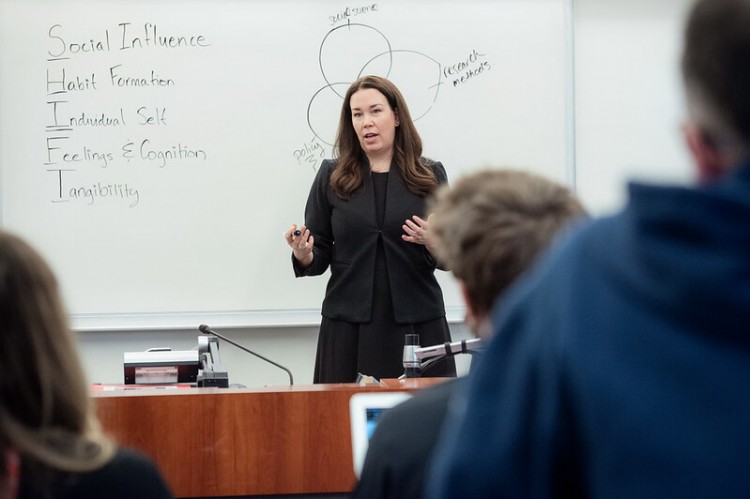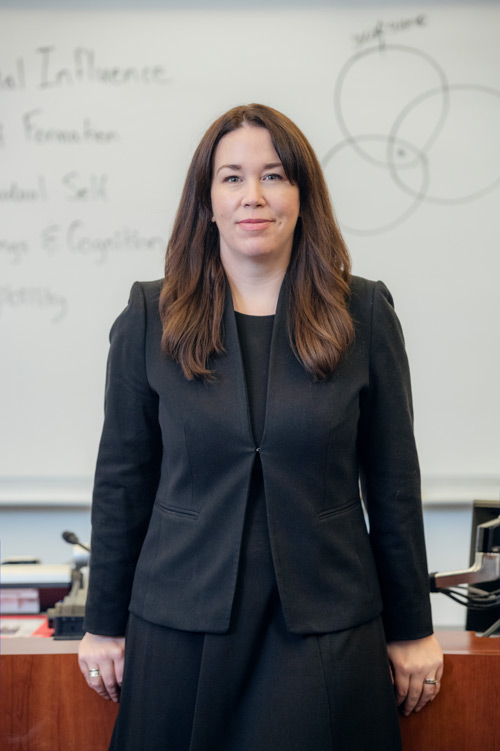
Professor Katherine White: this award-winning researcher focuses on “nudging” consumers to make sustainable choices

UBC Sauder Professor Katherine White’s field of study, decision science, intersects the fields of psychology, behavioural economics, and marketing, and explores why and how people make decisions. Behavioural insights (BI) refers to an approach that draws on decision science to “nudge” people to make better choices, both for themselves and for the world.
How did Professor White find her passion and go on to produce award-winning research at UBC Sauder? The answer lies in her early influences and her desire to leave a positive mark in the world, which is a value that resonates with her students today.
Finding her inspiration, and behavioural study as a career path
Professor White believes her passion for behavioural study was largely influenced by the work of her parents. Her father held a senior position at the Bank of Montreal and her mother was an artist. From them, she developed both an analytical and creative mindset.
In her youth, Professor White’s aspirations were actually far from the business world. In high school, she took cues from her mother, was interested in art and had plans to go to graphic design school. Being offered a small scholarship for a different program, however, pushed her to enroll in university, with art becoming something she did in her spare time.
After sampling a wide variety of university courses, the dynamic instructor of an introductory psychology course at Simon Fraser University stood out to her. The instructor, Dr. Gary Poole (who subsequently joined UBC’s Faculty of Medicine) studied social psychology and health behaviour change, something that resonated with Professor White: “The idea of helping people engage in healthy behaviours and helping cope better – those were things I was interested in, and I got very excited about his research.”
Professor White completed her undergrad with honours at SFU, and her masters in psychology at Waterloo. Life brought her back to the Vancouver area, and she began pursuing her doctorate in psychology at UBC.
It was at UBC that Professor White began considering how the business world and social psychology intertwined: the UBC Faculty of Commerce, as it was known at the time, had just hired a social psychologist in consumer behaviour.
“What I found was that what a lot of social psychologists were studying were measurements and evaluations of how people reacted to scenarios that were ‘bottled in a lab,’ which I found to be somewhat artificial,” says Professor White. “When I began to take these consumer behaviour classes at UBC, I started to realize that we can actually study real behaviours that have real consequences. This was exciting for me, because it’s harder to do: it’s easier to get someone to switch their attitude in a lab session for five minutes, but could you actually get people to change a meaningful behaviour, and monitor that change over time? It gave me a different lens, and a different understanding of the breadth of what we could study in this field.”
It was the study of these real-world behaviours that fascinated UBC Sauder BCom alum Brittany Wagner in the BI field, and led her to work closely with Professor White during her time at UBC Sauder. “Working with Professor White as a research assistant was the perfect opportunity to witness consumer choices first-hand,” says Wagner. “Her research projects gave me market research experience and allowed me to directly see what I was learning in my classes in real life. It was cool to observe the outcomes of certain studies and to see how the behaviours matched up with hypotheses.”
Research Spotlight: The S.H.I.F.T. Framework
Professor White’s impressive library of research includes the development of the influential S.H.I.F.T. framework. The acronym outlines factors communicators can leverage to influence behaviour:
Social influence
Habit formation
Individual self
Feelings and cognition
Tangibility
The S.H.I.F.T. framework, co-authored in 2019 in the paper “How to SHIFT Consumer Behaviors to be More Sustainable: A Literature Review and Guiding Framework” with Associate Professor David Hardisty and PhD alum Rishad Habib, represents a playbook to guide organizations that are interested in using BI to guide their consumers towards sustainable choices.
Organizations that have embraced the S.H.I.F.T. framework include multinational brands such as Amazon, Lululemon, Procter and Gamble, Starbucks, Unilever and Visa. Locally, they’ve worked with BC Hydro, BC Ferries, Arcteryx, Mountain Equipment Co-op, London Drugs, Vancity and the Government of Canada.
“How to SHIFT Consumer Behaviors to be More Sustainable: A Literature Review and Guiding Framework” has received a number of awards and distinctions, most recently on December 15, 2021, when the American Marketing Association (AMA) named the paper a winner of the AMA-EBSCO-RRBM Award for Responsible Research in Marketing.
Professor Katherine White is the UBC Sauder School of Business’ Senior Associate Dean, Equity, Diversity and Inclusion, the Academic Director of the Peter P. Dhillon Centre for Business Ethics, a Professor in the Marketing and Behavioural Science Division, and a key member of the Decision Insights for Business & Society (DIBS) Group. She holds the Professorship in Consumer Insights, Prosocial Consumption, and Sustainability, is the recipient of multiple research and teaching awards, and has ranked as high as number five worldwide for publications in A-level marketing journals.
